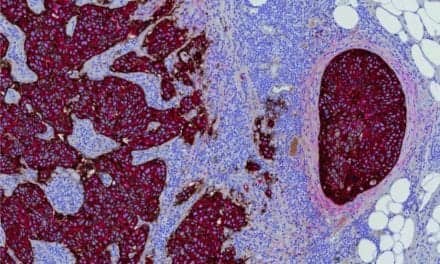Volition, a multi-national epigenetics company, detailed a new liquid biopsy cancer-detection method at the annual congress of the European Society for Medical Oncology (ESMO 2023¹).
In early-stage cancer, it is difficult to detect cancer-derived circulating tumor DNA (ctDNA) in the blood because it may comprise only 0.01% of the DNA present among a background of 99.99% normal DNA. Moreover, most of the cancer DNA has exactly the same sequence as normal DNA.
As physical separation of tumor derived and healthy circulating DNA has never before been achieved, current ctDNA detection methods involve DNA extraction, sequencing of all (cancer and normal) circulating DNA and analysis of the sequencing data using sophisticated computer bioinformatics, to tell them apart.
Liquid Biopsy Cancer-Detection Method
Volition’s novel method for liquid biopsy involving the first reported physical isolation of a class of tumor-derived ctDNA fragments from blood, the company says. Cancer-derived ctDNA fragments are then extracted after removal of all normal background DNA of the same sequence for detection with a simple, low cost PCR test.
“Based on our 13 years of work on the chemistry of circulating chromatin fragments, we have developed a transformational wet chemistry pathway that identifies and physically isolates chromatin fragments that we know are tumor-derived from background DNA of the same sequence, using Chromatin Immunoprecipitation (ChIP), followed by quantitative real-time PCR (qPCR) testing to establish whether cancer is present,” says Jake Micallef, PhD, chief scientific officer at Volition. “Removal of normal DNA obviates expensive and time-consuming DNA sequencing and bioinformatics allowing for rapid, cost-effective detection in a routine blood test.”
Volition’s proof of concept data, presented at ESMO 2023, demonstrates the isolation of tumor derived ctDNA fragments from plasma. Volition tested the new method in a first small clinical experiment and detected a range of liquid and other cancers, including at early stage I disease. For example, 74% of leukemias were detected at 96% specificity and 77% of colorectal cancers were detected at 92% specificity with 2-qPCR assays.
Further reading: Personalis’ MRD Assay Detects ctDNA in Lung Cancer Patients Earlier
“These early assays were developed using a leukemia model, but surprisingly also detected many other cancers including detecting colorectal cancer in a blood test with an accuracy approaching that of current Fecal Immunochemical Tests (FIT),” Micallef added. “The results to date are exciting and may pave the way for a whole new class of undiscovered biomarkers, with hundreds or thousands of possible targets. We are now developing a range of cancer-specific assays which we expect to be more accurate and look forward to sharing our progress beginning in Q1 2024.”
Michael Hubank, PhD, professor of Translational Genomics at the Institute of Cancer Research, and scientific director of Clinical Genomics at The Royal Marsden NHS Foundation Trust, added: “The novel CTCF-ChIP/qPCR method developed by Volition shows great promise for the accurate, rapid, low-cost detection of cancer. The test complements existing approaches and has the potential to reach the high levels of sensitivity and specificity required to detect early-stage disease. It may also be suitable for automation, enabling application in hospital laboratories. We look forward to working with Volition on further research and development in this important and exciting area.”
Notes:
- ‘A novel immunoprecipitation/PCR method for detection of plasma cfDNA fragments selectively occupied by CTCF in cancer.’ D Pamart et al. ESMO 2023
- In 2020 there were 19.3 million new cancer cases diagnosed worldwide – this is set to grow to 30.2 million by 2040. (Globocan Today and Globocan Tomorrow)
- In 2020, just under 10 million deaths were cancer-related (9.96m) which is also expected to increase to 16.3 million by 2040. (Globocan Today and Globocan Tomorrow)




